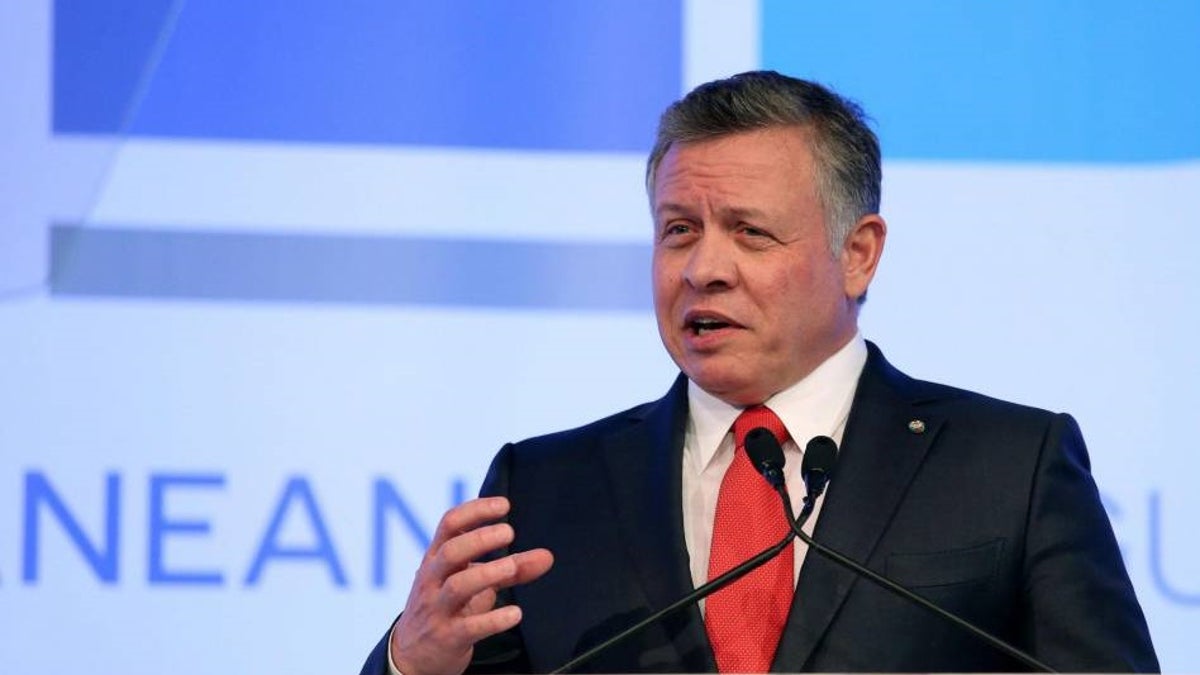
FILE -- Jordan's King Abdullah II (AP)
President Trump hosted his Egyptian counterpart Abdel Fatah el Sisi, earlier this week, for a White House meeting, the first U.S.-Egypt summit in seven years. Two days later, Jordan’s King Abdullah II will be welcomed in the Oval Office for his second meeting with Trump in the past 63 days. Among Washington’s Arab allies, Jordan increasingly has pride of place.
Appreciation for Jordan goes beyond frequent high-level confabs. Consider that in 2016, Egypt—with a population of 95 million—received just under $1.5 billion in U.S. economic and security assistance, while Washington gave Jordan, with about 9.5 million residents, nearly $1.7 billion.
Through moderate policies and an unabashedly pro-American orientation, Amman has attained an extremely rare status on Capitol Hill -- bipartisan support.
It wasn’t always so. In 1948 and again in 1967, the kingdom waged war against Israel. And in 1991, Jordan, under King Hussein, sided with its leading financial benefactor--Saddam Hussein—and remained “neutral” during the first Gulf War.
But in 1994, the kingdom signed a peace deal with Israel, and realigned politically and economically with the west. Since then, successive U.S. administrations and Republican and Democratic representatives alike have embraced Jordan.
To be sure, the kingdom has some problems. A year after the death of King Hussein and the coronation of King Abdullah, Freedom House downgraded Jordan from “partially” to “not free.” Media in the kingdom is highly restricted, democratic institutions are weak, and several dozen militant Islamist prisoners reportedly died mysteriously in prison last year.
Jordan is also facing a growing threat of Islamic radicalization. An estimated 3,000 Jordanian nationals are currently fighting the jihad in Syria; last year, there were several largescale terrorist attacks in the kingdom, all perpetrated by homegrown Jordanians. In a one year period, five American soldiers and contractors working at security installations were killed by “friendly fire”—more than the same period in Afghanistan.
Security lapses in 2016 recently led to a massive shakeup in the kingdom’s security apparatus. Last fall, for example, all six general officers in the Joint Chiefs of Staff were simultaneously retired. Then in December, the Minister of Interior was sacked. And just last week, the Chief of Intelligence was summarily replaced.
Despite these troubles—or perhaps because of these issues—strategic cooperation between Washington and Amman is increasing. Today, Jordan is not only the base of operations for the U.S.-led campaign against the Islamic State in Syria, it is the Washington’s principal regional (i.e., Arab) partner in the endeavor. Unlike, say, Egypt—which has not deployed ground troops outside its borders since Operation Desert Storm in 1991 —the kingdom is flying bombing sorties over Syria and participating in joint special ops missions with U.S. soldiers in Syria.
Equally important, King Abdullah remains an enthusiastic advocate for religious tolerance and moderate Islam. While it’s unclear his message is gaining much traction at home, he is clearly speaking Washington’s language.
At the National Prayer Breakfast in February, with president in the audience the King referred to the Islamic State as “khawarej; outlaws to our faith.” “People nowadays talk about ‘fake news’; the khawarej,” he said, “produce ‘fake Islam’.”
The King’s speech and their February 2nd meeting appear to have made an impression on President Trump. That evening, as King Abdullah winged his way back to Amman, the White House issued a strong statement—echoing a traditional Palace talking point—urging Israel to “refrain from taking unilateral actions…including settlement announcements.”
More recently, according to press reports, the Trump administration demurred from designating the Muslim Brotherhood as a terrorist organization at the behest of Jordan, where the brothers form the largest parliamentary bloc.
In contrast to most foreign visitors, the White House is unlikely to have a “big ask” from King Abdullah during the visit. But Jordan is likely to ask Washington for additional military and economic assistance.
The kingdom’s military has been stretched since 2011 by constant deployments along the northern and eastern frontiers. Recent years have been especially tough on the kingdom’s traditionally feeble economy, as well. Hosting 1.4 million Syrian refugees has proved expensive. Worse, the borders with leading trade partners Syria and Iraq have been closed for years. According to the World Bank, only 36 percent of Jordanians participate in the labor force. Among those who are actively want to work, the unemployment rate is at 16 percent. To narrow the burgeoning budget deficit, the government recently instituted a large and regressive Value Added Tax. The local mood is dour, and protests are increasingly common.
King Abdullah reportedly wants to increase baseline U.S. funding commitment from $1 billion to $2 billion per year.
Although the Trump administration is looking to decrease foreign aid, Jordan’s request deserves special consideration. Given import of Jordan and the general regional deterioration, the stability of the kingdom would seem a wise investment.








































